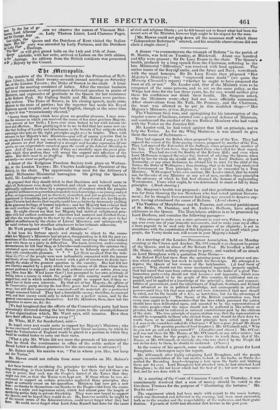A dinner "to commemorate the triumph of Reform "in the
parish of St. Martin, was held on Tuesday, at Blackwell. About one hundred and fifty were present; Sir De Lacy Evans in the chair. The Queen's • health, prefaced by a long speech from the Chairman, referring to the late Ministerial "difficulties," was received with loud applause. The outine toasts of the RoyallFamilv, and the Army and Navy, were drunk with the usual honours. Sir i)e Lacy Evans then proposed "Her Majesty's Ministers ;" but "expressed some doubt" (we quote the Morning Chronicle's report) "whether he ought to have proposed the toast at all, or not." Mr. Leader said, that if the Ministry were to be Morning Chronicle's report) "whether he ought to have proposed the toast at all, or not." Mr. Leader said, that if the Ministry were to be composed of the same persons, and to act on the same policy, as the Whigs had done for the last three years, he, for one, would neither give them his confidence nor drink their health. Mr. Simpson asked, who the Ministers were—they had not been officially announced. After observations from Mr. Tulk, Mr. Pouncey, and the Chairman, the toast was allowed to be put in this modified shape—" Her Majesty's Ministers, if true nijiwiners." The Chairman then rose, and apologizing for his interruption of the regular course of business, entered into a general defence of Ministers, and condemned the conduct of the ten Radical Members who had voted with the Tories on the Jamaica Bill.
Mr. Leader said, he had voted against that bill on principle, not to help the Tories. As for the Whig Ministers, it was absurd to give them the name of Reformers—
They had opposed the Ballot, when proposed by one of the Ten. They had fliiposed the repeal of the Rate-paying clauses, proposed by another of the Ten. They Lad opposed the Extension of the Suffrage, when proposed by another of the Ten. On the Corn-laws, they declared those who called for their repeal, lunatics. They had' decreed the tinolity of the Riform Bill; and even when Lord Melbourne resigned the mi.er day, instead of advising the Queen, when asked by her for whom she should scud, to apply to Lord Durham, or Lora Normanby, or any other Reformer, he advised her to send fisr the chief of the Tories, the Duke of Wellington ; thus showing, that as he had long conducted the Government on Tory principles, he wished to be succeeded by a Tory Ministry. With respect to his own conduct, Mr. Leader stated, that he would not, for the sake of any Ministry or any set of men, sacrifice those principles by the advocacy of which he had first obtained the honour of representing Westminster. Come what might, he was determined to stand or fall by those principles. (Much cheering.) Mr. Simpson's health was proposed ; and that gentleman said, that he was far from blaming the ten Members who had voted against Govern- ment; for he thought Government had long ago ceased to deserve sup- port, having abandoned the cause of Reform. (Loud cheers.)
The Vestries of Marylebone and St. Pancras, and several parishioners of St. Bride, St. Dunstan, and St. Andrew, Holborn, have adopted addresses to the Queen. The Marylebone address is to be presented by Lord Durham, and contains the following passage—
"Theis attempt to make you a state prisoner in your own Palace, to place a spy over every one of your domestic movements, and to make your royal office a mere pageant to be used only for the purposes of an oligarchy, is not in. accordance with the constitution of' this kingdom ; and is an insult which your people, the Vestry doubt not, will resent in your Majesty's behalf."


























 Previous page
Previous page